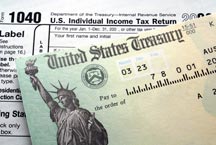 Unfortunately the North Carolina Medical Society (NCMS) has fielded five calls this tax season from doctors who have reported being victims of an Internal Revenue Service (IRS) tax scam. According to the reports, which are similar to those last year, someone is filing fraudulent federal income tax returns using physician names, addresses and Social Security numbers. The scam is not targeted at physicians, but many contacted the NCMS last year, prompting us to seek advice for our members from the authorities.
Unfortunately the North Carolina Medical Society (NCMS) has fielded five calls this tax season from doctors who have reported being victims of an Internal Revenue Service (IRS) tax scam. According to the reports, which are similar to those last year, someone is filing fraudulent federal income tax returns using physician names, addresses and Social Security numbers. The scam is not targeted at physicians, but many contacted the NCMS last year, prompting us to seek advice for our members from the authorities.
This particular scam is a popular identity theft scheme. The IRS issued a report on this type of identity theft affecting tax payers in a publication called the Dirty Dozen Tax Scams for 2015.
The majority of those affected first become aware of it when they receive an IRS 5071C letter advising them of possible fraud. Others are receiving a rejection notification when attempting to electronically file their tax return. It indicates it cannot be submitted because a return has already been filed under that Social Security number. At least one person learned of the fraud when he received a large tax refund check before filing a tax return.
Next steps; act quickly
- IRS – If you are a victim of this scam, you’ll note the IRS 5071C letter provides instructions about contacting the IRS through its identity theft website or by phone at (800) 830-5084 to let officials know you did not file the return referenced in their letter. If you are a victim, you may not be able to electronically file your return this year since a return with your Social Security number has already been filed. You’ll need to file a paper return and attach an IRS 14039 Identity Theft Affidavit to describe what happened. Attach copies of any notices you received from the IRS, like the 5071C letter. Be sure to let your tax preparer know if this happens to you. Verify with the IRS and your tax preparer where to mail your paper tax return, based on the type of return you are filing and your geographic area.
If you have not received a notification from the IRS but believe your personal information may have been used fraudulently or are concerned about whether you may have been victimized, call the IRS Identity Protection Specialized Unit at (800) 908-4490. Find more information from the IRS, including forms, at the IRS website. - Office of the North Carolina Attorney General – Physicians affected should contact the North Carolina Attorney General’s Office at 1-877-5-NO-SCAM toll free within North Carolina or file a consumer complaint online at http://www.ncdoj.gov/. Their website also lists steps for identity theft victims to take .
- Federal Trade Commission (FTC) – File a complaint with the FTC here. This not only helps the FTC identify patterns of abuse, but the printed version becomes your Identity Theft Affidavit. Along with a police report, that affidavit becomes your Identity Theft Report, which you will need. The FTC recommends other immediate steps and provides helpful information here.
- Police report – Consider filing a report with the local police where you reside. Bring all documentation available, including any state and federal complaints you filed. This will likely be necessary if there is financial account fraud as a result of the identity theft. However, if the only fraud is tax fraud, the police report will be necessary only if requested by the IRS.
- Social Security – Call the Social Security Administration’s fraud hotline at (800) 269-0271 to report fraudulent use of your Social Security number. In case your number is being used for fraudulent employment, you can also request your Personal Earnings and Benefit Estimates Statement here or call (800) 772-1213. Check it for accuracy.
- U.S. Department of Justice (DOJ) – Consult the DOJ website for additional information.
NCMS next steps
The NCMS continues to monitor this matter and will forward information to relevant agencies. Please notify us if you have been victimized by this tax scheme so we can convey the scope of the situation to the proper authorities. Contact the NCMS at 919-833-3836 or email Belinda McKoy at [email protected]. Watch your email and the NCMS eBulletin for any updates on this matter.
